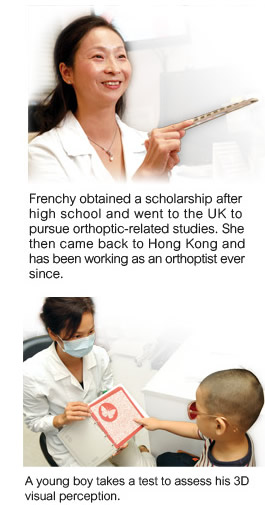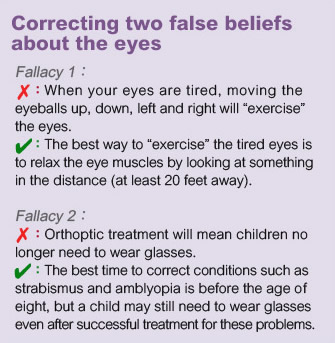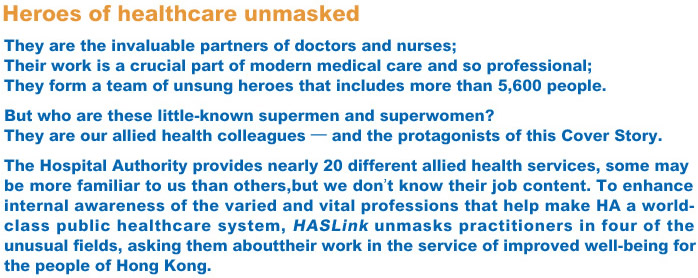


|
||||||||||
|
1) Orthoptic assessment and management for conditions such as strabismus, amblyopia and binocular function anomalies. 2) Measuring the axial length and curvature of the eyes and identifying the appropriate power of the intraocular lenses to be implanted as part of corrective surgery for cataract patients. 3) Performing visual field examination, particularly for glaucoma patients. 4) Paediatric visual examinations. Curiosity first drew Frenchy to march into the field and, later, she secured a scholarship to undertake an orthoptic training course in the UK. "Orthoptics is considered quite uncommon - both in Hong Kong and overseas - because there are only a relatively small number of practitioners. Orthoptic services are mostly provided through hospitals and clinics. There are few private-sector practitioners." she said. She says orthoptists must have empathy and patience. "The information we collect during examinations comes largely from patient responses, so we must understand how they feel, advise them with clarity and kindness, and ensure we give them the time to tell us precisely what they can or cannot see, in order to facilitate a full and accurate diagnosis." The most challenging cases are those involving children. "60% of my patients are children suffering from refractive disorders such as nearsightedness, farsightedness, astigmatism and amblyopia. Most of them are afraid to talk to strangers, so I have toys in my office and chat casually with them before the examination. This helps us become friends, with a visit to my office being for fun rather than to see a doctor. But if they are reluctant to undergo an examination, I prefer to arrange another appointment rather than force them and create anxiety." |

|
|||||||||

|
|
|||||||||
|
With a background in electronic engineering, Anthony's first job after graduation was with the Hong Kong Society For the Deaf. His colleagues introduced him to an overseas audiology course. "I was curious. I decided to go to the UK to study because I felt it is a value added for my future career prospects. I've now been working at UCH for 16 years," he said. "We mainly follow up on referrals from Ear, Nose and Throat (ENT) specialists, providing diagnostic and rehabilitation services for hearing impairments and related aural issues. We need to fit customised hearing aids for those who suffering from deafness," Anthony explained. With Hong Kong's aging population and the increased use of earphones, hearing related problems among people is also arising. He believes future demand for audiologists will be strong. Anthony says the best way to help patients is to make them feel comfortable with the equipment, rather than to insist that they hear every sound clearly. He notes one case of a congenitally deaf woman who had hearing aid, but, due to her discomfort when wearing them, had not used them for 20 years. Anthony spent two years time on hearing aid adjustment, encouraging her to try again, successfully building her self-confidence and enabling her to communicate more easily.
|
 |
|||||||||
|
|
|
|
|
|
|
||||
